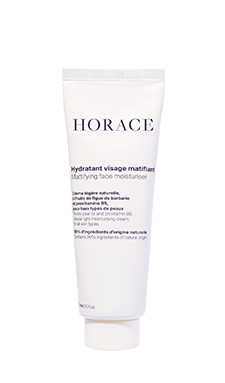

Why and how to moisturise your skin
Words Pauline Allione
Translated by Sébastien de Turenne
Share the article on
Everything you need to know about moisturising your skin.
The question pops up every year without fail. As winter rears its head, temperatures drop, and you start to wear a hat and scarf again, your skin begins to suffer from some very familiar ills: tightness, redness, and general discomfort. There’s no magic solution. If you want to soothe your skin and protect it from external aggressions, you have to moisturise it. This still leaves a few outstanding questions. Why is our skin thirstier in winter to begin with? Why is moisturising so important? What’s the best way to go about it? Dr Isabelle Gallay is a French dermatologist, venereologist, and vice-chair of the National union of dermatologists and venereologists. She was kind enough to answer some of our questions about moisturising.
How does skin say moisturised?
Let’s start from the beginning: your skin is an organ consisting of several layers of tissue that needs to be nourished. The corneum is the epidermis’ outermost layer. It consists of dead skin cells and is protected by the acid mantle, a protective film of sweat and sebum (among other things). This barrier protects the skin from aggressions and helps keep it moisturised. When this film gets damaged, the skin becomes vulnerable. This is where a moisturiser comes in to help rebuild this protective layer. “When you moisturise, you provide your skin with various surface substances that will compensate for any potential dryness-related deficiencies. The process is the same for both weather-induced and natural, pathological dryness”, explains Dr Gallay, before adding: “These substances are mainly molecules called natural moisturising factors, which will make up for the factors your skin might be lacking.” All these elements – amino acids, hyaluronic acid, lactic acid – are important as they help hold water and thereby keep your skin moisturised.
Hot, cold, windy… why is the weather so hard on our skin?
While your skin is supposed to moisturise itself, aging and external aggressions tend to make it dry. As indicated by Dr Gallay, our skin becomes more or less sensitive to dehydration based on the weather: “The sun’s infrared light will heat up your skin, leading to evaporation and dehydration. In winter, the cold will make blood vessels contract and thereby reduce nutrition intake. It’s mostly the wind and other aggressive weather-related factors that will lead to cellular dehydration, she explains. Other elements, such as getting old or having an active lifestyle can impede your skin’s capacity to moisturise itself: “If you exercise a lot, or if you fill your days with intensive activity, your body will draw on its reserves, which then need to be replenished,'' explains Dr Gallay.
What’s the real risk of having insufficiently moisturised skin? Dry skin is duller, tighter, and subject to redness, and irritations… discomfort incarnate. But that’s not all: “Your skin isn’t as well protected, and it will let bacteria and microorganisms through… The skin barrier isn’t as effective”, says the dermatologist. Moisturising regularly is recommended, even more so in summer and winter, when the external environment tends to attack your acid mantle.
Moisturising: a daily grooming essential
Depending on your skin type, routines can vary: a light moisturiser in the morning can be enough for normal skin types. On the other hand, skins with conditions that dry the epidermis such as dermatitis, atopic dermatitis, and psoriasis require more frequent moisturising, up to twice a day if necessary. Should you be fortunate enough to not suffer from such a skin disease, we recommend choosing a moisturiser’s richness based on your skin type, and to put it on your clean skin in the morning to protect it from pollution and weather-related factors. Repeat the process in the evening. “While you should generally use light and protective cream in the morning, evenings are best for creams that will rebuild your skin’s reserves, with polyunsaturated fatty acids, omega-3s, etc. They will make up for the cell membrane deficiencies”, explains Dr Gallay. Good advice for any weather: in winter, when the cool temperatures put a strain on your skin, buried under layers of clothing, as well as the rest of the year.
